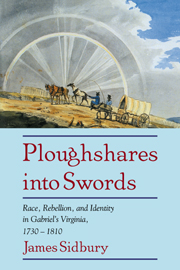Book contents
- Frontmatter
- Contents
- Acknowledgments
- Introduction
- Prologue: From Blacks in Virginia to Black Virginians
- 1 The emergence of racial consciousness in eighteenth-century Virginia
- Part I Cultural process: Creolization, appropriation, and collective identity in Gabriel's Virginia
- 2 Forging an oppositional culture: Gabriel's Conspiracy and the process of cultural appropriation
- 3 Individualism, community, and identity in Gabriel's Conspiracy
- 4 Making sense of Gabriel's Conspiracy: Immediate responses to the conspiracy
- Part II Social practice: Urbanization, commercialization, and identity in the daily life of Gabriel's Richmond
- Epilogue: Gabriel and Richmond in historical and fictional time
- Appendix: Richmond households in 1784 and 1810
- Index
3 - Individualism, community, and identity in Gabriel's Conspiracy
Published online by Cambridge University Press: 04 August 2010
- Frontmatter
- Contents
- Acknowledgments
- Introduction
- Prologue: From Blacks in Virginia to Black Virginians
- 1 The emergence of racial consciousness in eighteenth-century Virginia
- Part I Cultural process: Creolization, appropriation, and collective identity in Gabriel's Virginia
- 2 Forging an oppositional culture: Gabriel's Conspiracy and the process of cultural appropriation
- 3 Individualism, community, and identity in Gabriel's Conspiracy
- 4 Making sense of Gabriel's Conspiracy: Immediate responses to the conspiracy
- Part II Social practice: Urbanization, commercialization, and identity in the daily life of Gabriel's Richmond
- Epilogue: Gabriel and Richmond in historical and fictional time
- Appendix: Richmond households in 1784 and 1810
- Index
Summary
Gabriel sought to overthrow Virginia's social structure and to free all Virginians of African descent. Instead, only three enslaved individuals – Pharoah Sheppard, Tom Sheppard, and Prosser's Ben – acquired freedom as a result of Gabriel's Conspiracy, two by informing Whites of the approaching insurrection and one by testifying at length during the trials of alleged conspirators. Slave conspiracies and revolts, like other subaltern attempts to overthrow oppressive social structures, were plagued by informers. Scholars have generally analyzed informers through moral categorization, treating them as weaklings who sold out their true allies for the “economic regard and … freedom” that Whites offered turncoats.
Such moral categorization creates comfort, neatly classifying those who lived in Gabriel's world according to modern observers' sympathies. This comfort is purchased, however, at a cost that few stop to acknowledge. Ascribing betrayal to simple cowardice and venality – to bad personal qualities – allows historians to sidestep the ways in which Pharoah's betrayal (no less than Gabriel's Conspiracy) grew out of the Creole cultures that had developed in Virginia by the end of the Revolutionary War period. Those who decided whether to join Gabriel's Conspiracy faced a range of choices, some of which offered long odds for fundamental change and others of which offered better chances for incremental change. Only rarely, as in the case of Gabriel's Conspiracy, would the various strategies have conflicted with one another. The conspiracy offered the longest odds and, in freedom for all enslaved people, the most fundamental change, and those who unequivocally joined implicitly rejected other strategies. Many potential conspirators hesitated, however, preferring delay or hoping to join “half-way” while holding other options open.
- Type
- Chapter
- Information
- Ploughshares into SwordsRace, Rebellion, and Identity in Gabriel's Virginia, 1730–1810, pp. 95 - 117Publisher: Cambridge University PressPrint publication year: 1997



